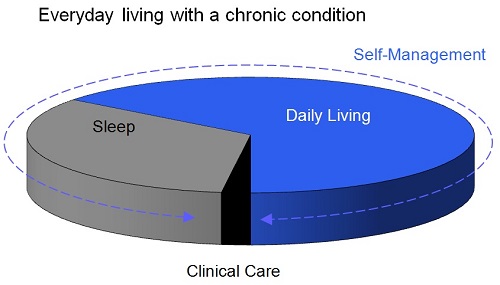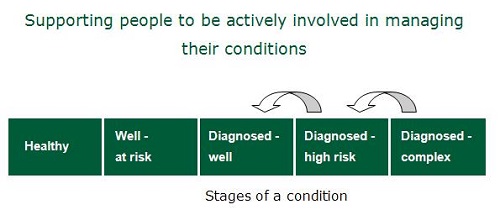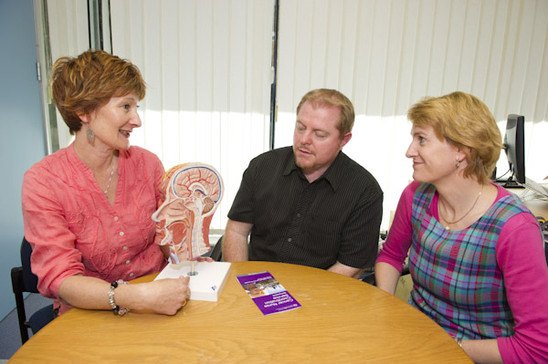People living with chronic conditions and their carers, have become principal health care providers and funders in their own right. A significant proportion of day-to-day management of their conditions can be under their direct control.

Health care providers all along the continuum of care, as well as providing clinical care, can support patients to optimise how they self-manage when they return to home.

Definitions
What is a chronic condition?
Chronic conditions are characterised by:
- complex causes
- multiple risk factors
- long latency periods
- a prolonged course of illness
- functional impairment or disability.
Most chronic diseases or conditions do not resolve spontaneously and are generally not cured completely.
Some chronic conditions:
- can be immediately life-threatening, for example stroke
- can persist over time and can be intensive in terms of management, for example: diabetes
- .are not always the cause of death, for example arthritis.
What is chronic condition self-management?
Self-Management is defined in the National Chronic Disease Strategy and the WA Chronic Conditions Self-Management Strategic Framework as simply ‘the active participation by people in their own health care’.

Self-managing a condition
People living with chronic conditions already manage their conditions on a daily basis and to varying degrees. Self-managing involves:
- knowing about your condition
- sharing in decision-making
- following an agreed care plan
- monitoring and managing signs and symptoms
- managing the impact on physical, emotional and social life
- adopting a healthy lifestyle and
- having the confidence and ability to access to community support services.
What is chronic condition self-management support?
Self-management support is what health care providers, organisations, systems and the community do to support people living with a chronic condition to be actively involved in their own health care.
Principles of CCSM support

At the core of self-management support is a partnership between health providers and consumers. Commonly accepted principles for self-management support are:
- person-centred care
- consumer empowerment and enhanced capacity
- participation by consumer and carers
- partnership between health provider and consumer
- shared responsibility for outcomes
- coordination of support
- access to appropriate, timely and understandable information
- holistic, lifelong approach to health.
What is a self-management approach?
The self-management approach emphasises the person’s central role in managing their health.
It includes strategies of assessment, collaborative care, client empowerment and enhanced capacity, links them to community resources, and employs a holistic, lifelong approach to health and self-care.
The self-management approach can be utilised anywhere along the healthcare continuum.
Principles of person-centred care

- respect for patients’ values, preferences and expressed needs
- coordination and integration of care
- information, communication and education
- physical comfort
- emotional support and alleviation of fear and anxiety
- involvement of family and friends
- transition and continuity
- access to care.
What is a chronic condition self-management program?
Self-management programs offer people with chronic conditions the knowledge, skills and resources to help them better manage their health.
CCSM programs are not:
- educational programs
- cognitive behaviour therapy (CBT)
- peer support groups on their own.
Resources
Information sheets
Produced by
Chronic Condition Self-Management